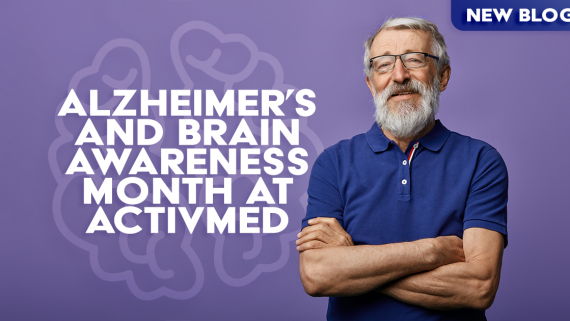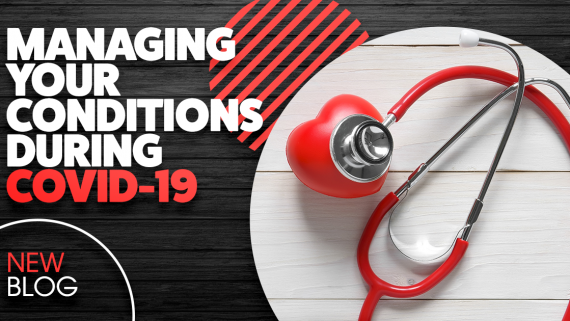An estimated 50 million people are living with Alzheimer’s or other dementia. June is the inaugural commencement of Alzheimer’s and Brain Awareness Month. The Alzheimer’s Association states that “every person who has a brain is at risk.” This is the perfect time to act and create awareness for this expanding public health crisis. ActivMed is taking action in another way. With over 800 clinical trials completed between four free-standing facilities, our efforts are improving access to care and treatment planning.
Alzheimer’s and Brain Awareness Month

The purpose of Alzheimer’s and Brain Awareness Month is to raise awareness about the brain, Alzheimer’s, and other dementias on a global level. June also marks a time to recognize the millions suffering from Alzheimer’s and other dementias, along with the caregivers that are so essential in their care. June 20th is the summer solstice as well as the Longest Day fundraiser which raises money towards finding a cure for Alzheimer’s. Anyone can get involved, and currently, most of the activities can be modified to meet social distancing requirements.
ActivMed’s Role in Alzheimer’s Disease and Brain Health
ActivMed Practices & Research has partnerships with more than 40 physicians and six major hospitals in greater Boston and Southern New Hampshire. The company has four clinical research offices, providing access to nearly 2.5 million people. Our Lawrence location is set-up within the New England Neurological Associates, offering those with memory loss more options.
ActivMed offers free health screenings for glucose, depression, memory, blood pressure, and pulmonary.
In response to the current social distancing guidelines, ActivMed now offers telehealth memory screens. These brief cognitive assessments can provide insight into one’s cognitive abilities. Although no diagnosis is provided, it can be a tool used for early intervention in the event results warrant it. No insurance is required, and all information is kept confidential.

Since 1994, ActivMed Practices & Research, Inc. has conducted studies in the areas of Neurology, Family Medicine, Psychiatry, Dermatology, Gastroenterology, Pain, Nutraceuticals, Vaccines, Medical Devices, and more. ActivMed is also Virtual Trial Capable. Click on the links to learn more about the currently enrolling studies for Alzheimer’s at the Lawrence and Methuen locations.
References:
https://www.alz.org/abam/overview.asp
https://www.seniorlifestyle.com/resources/blog/alzheimers-brain-awareness-month/
http://act.alz.org/site/MessageViewer?em_id=156121.0
If you have survived a stroke or heart attack, your chances of having another one are 1 in 4. The good news is, up to 80% can be prevented through managing chronic conditions, and lifestyle modifications. May is American Stroke Month, and the 2020 initiative is “One is Enough” which focuses on preventing another stroke. Not all risk factors are within your control, but for the ones we can control, it is time to make changes, even in the midst of COVID-19.
Chronic Conditions and Stroke Risk

A stroke happens when a clot or rupture blocks blood vessels that carry oxygen and nutrients to the brain. This disruption in the flow of these vital nutrients results in the death of brain cells. Depending on the severity of the stroke, and where it occurs in the brain, the resulting damage can vary. Stroke sufferers can have paralysis, speech or language problems, memory loss, and changes in behavior.
Several risk factors increase your risk of stroke. Family history, age, and gender are factors that no one can change. However, managing chronic conditions such as heart disease and diabetes play a vital role in prevention and reoccurrence. Diabetes and heart disease impairs your body’s ability to effectively transport oxygen and the critical nutrients we mentioned earlier to your brain. By working with your doctor and following their plan to manage these conditions, you can reduce your risk of stroke. Eating a healthy diet, staying active at least 150 minutes a week, and living tobacco-free are some of the lifestyle recommendations the American Stroke Association suggests in addition to the management of chronic conditions.
Hidden Dangers of Stress and the Pandemic
The COVID-19 pandemic has taken the world by storm, changing life as we knew it. In addition to fears of contracting the virus, many lost their jobs and businesses, creating a financial and emotional strain few have seen before. During these unprecedented times, stress levels have understandably risen. However, continued stress over long periods can increase your risk of developing certain heart diseases such as high blood pressure if not managed. High blood pressure is the number 1 controllable risk factor for stroke.
Know the Signs
The American Stroke Association uses the acronym “FAST” to help recognize the symptoms of a stroke to get immediate medical attention. It may mean the difference between recovery and disability, so knowing the signs is vital:
- F (Face Drooping)- Does one side of the face droop, or is it numb? Ask the person to smile. Is the person’s smile uneven or lopsided?
- A (Arm Weakness)- Is one arm weak or numb? Ask the person to raise both arms. Does one arm drift downward?
- S (Speech)- Is speech slurred? Is the person unable to speak or hard to understand? Ask the person to repeat a simple sentence.
- T (Time to call 9-1-1)- If the person shows any of these symptoms, even if the symptoms go away, call 9-1-1 and get them to the hospital immediately.

ActivMed offers free health screenings for blood glucose, blood pressure, and more. To learn more, visit our website here.
During COVID-19, ActivMed Practices and Research is committed to ensuring the safety of our patients and staff. Click here for our latest COVID-19 facility updates.
References:
https://www.stroke.org/en/life-after-stroke/preventing-another-stroke


